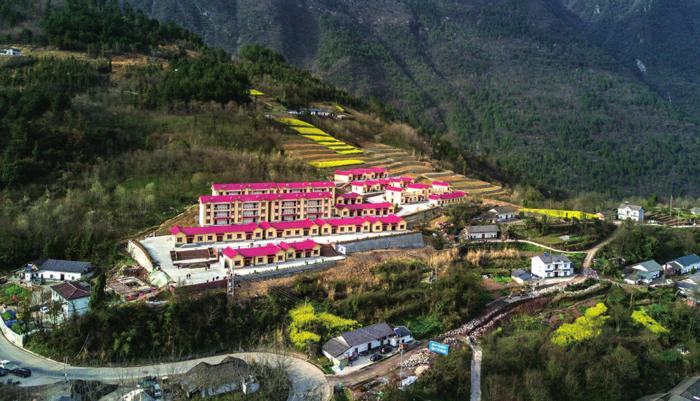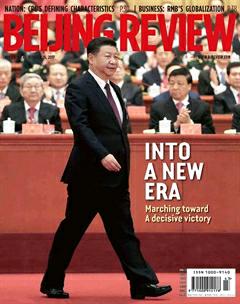Development in All Aspects
By+Kou+Liyan
Every five years, foreign expats who work and live in Beijing—from executives of multinational companies to journalists and teachers—take time out from their daily business to see whats going on in Chinas politics, a topic also kindled by local taxi drivers. The National Congress of the Communist Party of China (CPC) is held every fi ve years.
On the occasion of the 19th CPC National Congress, convened in Beijing on October 18, many foreign friends are taking it as a way of getting a handle on the Partys actions over the past five years and catching a glimpse of the course the country will take in the next fi ve years and how it will affect them. I recommend that they should read two books. The fi rst one is Seven Years as an Educated Youth, which tells readers stories of Xi Jinping, General Secretary of the CPC Central Committee, in a poor village from 1969 to 1975. The other one is Up and Out of Poverty written by Xi. Both books can give some insight into the logic behind all the domestic and foreign policies that China has introduced in the last fi ve years.
A basic logic of poverty alleviation
The CPC holds that all national policies must be based on the reality that China is still in the primary stage of socialism. The country needs to make great efforts to improve peoples livelihoods. Poverty alleviation, therefore, is a basic element of government policies. However, poverty is not confi ned to the economic sphere. As President Xi Jinping wrote in the book Up and Out of Poverty, published in 1992, “to shake off poverty we must fi rst of all shake off poverty of mind.”
President Xi has a deep understanding of poverty. He was sent to an impoverished village in arid northwest China in 1969, at the age of 15, and lived there for seven years. Under dire food shortages, Xi and local villagers subsisted on grain chaff for most of the year. Meat was absent from the local diet, and even vegetables were scarce. There was no electricity, and fuels were hard to come by. To collect wood for heating and cooking, villagers risked their lives fi shing logs from torrential fl ood waters. And as there was no means of transportation, they had to walk for miles carrying 200 or more pounds of grain on their backs.
The seven years in the village of Liangjiahe exposed young Xi to the fact that many of his countrymen had to struggle to feed and clothe themselves. After being elected as village head, Xi explored the use of methane for fuel, set up a blacksmith shop and a sales agency, and established literacy classes. By the time he left the village to study at a university in Beijing, local life had signifi cantly improved.endprint
After reading about Xis seven years in the countryside, one can easily understand why China adopted the policy of reform and opening up. When Xi was elected as the leader of the Party in November 2012 and then President of China in March 2013, most Chinese were living a well-off life, but poverty was yet to be eradicated.
This problem can be perceived in two ways. First, economically, more than 100 million Chinese still live beneath the poverty line; second, those who have been lifted out of poverty expect continuing improvement. They yearn for a life of abundance in all aspects, which is what the CPC has been working toward and will continue to pursue over the next fi ve years and beyond.
A comprehensive strategy
Poverty alleviation calls for extensive and coordinated efforts. This is why China put forward the Four-Pronged Comprehensive Strategy, which is to complete building a moderately prosperous society in all aspects, deepen reform, advance law-based governance of China, and strengthen Party self-discipline.
Building a moderately prosperous society in all aspects means leaving no people behind and equally advancing economic, political, cultural, social and ecological progress. This boils down to the goal of common prosperity and all-round development for the people.
Over the past fi ve years, Chinas average per capita disposable income has risen by 7.4 percent annually, and the number of impoverished people has plummeted 55.64 million. Today, 99.7 percent of rural residents have access to paved roads and electricity. The CPC has promised to eradicate poverty in China by 2020.
Meanwhile Chinese people also enjoy a richer cultural life. Internet users now stand at 1.1 billion, and last year, cinema visits reached 1.37 billion. Online social networking, shared bike service and mobile payments, among other innovations, are profoundly changing peoples lives. China is now indeed on the path toward prosperity in all aspects.
Deepening reform provides the sustained drive towards all-round development. China has witnessed tremendous changes since the country started reform and opening up in 1978. This is why the current Chinese leadership resolutely adheres to the reform and opening-up policy.
In the past five years, the Central Government has introduced 330-plus reform measures in 15 realms, delegated power or cancelled the requirement for government reviews on 618 items, and abolished the practice of non-administrative review. Through these reforms, the sphere of government control is shrinking, government review and approval procedures have been simplified, and the governments function as provider of public services has been reinforced. In the process the Chinese economy has become more integrated with the world economy, more open, and more market-based.endprint
The rule of law provides institutional support for national development. By the time the 18th National Congress of the CPC convened in 2012, Chinas legal system had been much improved, but not yet to the point where it was commensurate with the level of national development; it was still marred by many fl aws. China, therefore, has continued to advance the rule of law over the past five years, making or revising 48 laws, 42 administrative rules, 2,926 local decrees, and 3,162 regulations; it has also amended 57 laws and 130 administrative rules, as revision of one clause in a law usually necessitates revision of other related laws and administrative rules. In addition, nearly 80 Party regulations have been formulated or revised.
Meanwhile, a number of cases of wrongful conviction have been reheard. Since July 2016, all Supreme Court sessions open to the public have been broadcast live on the Internet, and lower-level courts have followed suit on 600,000 occasions.
Strengthening Party self-discipline is the political precondition for national development. Being the ruling party for nearly 70 years, the CPC faces the question and mission of how best to govern itself, both of which are also part of the discussion on the Chinese path and Chinese democracy. Xi has felt a strong bond with the Party since his youth. When in Liangjiahe, he wrote 10 applications to join the Party. After being admitted, he devoted himself to Party work, both as a student and later as a local magistrate.
Since its 18th National Congress, the CPC has placed greater emphasis on self-purifi cation, self-perfection, self-renewal and self-progression, which decide not only the vitality of the Party itself, but also the success of its mission to lead the Chinese nations great rejuvenation.
Over the past five years, the CPC has strengthened discipline among its members by improving ideological and ethical education and Party organizations and institutions and by combating corruption. More than 50 Party regulations have been formulated to institutionalize and standardize the political life of Party members. A number of corrupt senior offi cials, commonly known as “tigers,” have been snared, and 240 centrally administered offi cials have been investigated, 223 of whom received punishments. Meanwhile, 1.14 million Party members in the position of section chief or the equivalent and below, often referred to as “fl ies,”have been punished for discipline violations. A new inspection system has been instituted at all levels of government. And reform of the Partys disciplinary inspection system is under way.endprint
An alternative for the world
Another new development over the past five years is the closer alignment of domestic and foreign policies. The expression, “consider the overall domestic and international situations”has been recurrent in the Partys policy papers. The Four-Pronged Comprehensive Strategy itself refl ects the CPCs global thinking.
Party work and the socio-economic development of China should both be placed in the context of the nations opening up, which exposes them to extensive exchanges with the rest of the world that benefi t both sides. The development of China and its thoughts on state governance can inspire the international community to look at more options when trying to resolve the problems in development. For instance, certain regions mired in economic imbalance and social disorder can borrow from Chinas experience in overall planning; regions where economic growth has lost steam, and where society is static and divided may follow Chinas example of deepening reforms; and for the nations faltering under political instability and feeble government, whose elected leaders fail to represent the people or turn around diffi cult situations, China offers relevant references for the ruling partys institutional design and capacity building.
Chinas experience and practices are not the sole answer to these problems; they instead represent alternatives for the world. Even when handling domestic issues, the CPC never regards any of its policies or measures as a panacea. One catchphrase frequently heard in recent years is, “always on the road,” meaning pressing on continuously with both reforms and Party discipline. It is in this spirit that the CPC is advancing development of the nation in all aspects, and seeking solutions to problems that crop up in the process. Overcoming these problems will lead China to greater development, thus creating a benign spiral.endprint

